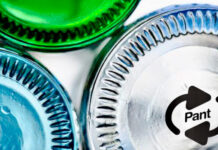A green Italian polystyrene, made from plant waste, could soon replace petroleum-derived polystyrene, the leading pollutant of microplastics in the sea. The new sustainable material is the award-winning creation (at BioInItaly and Bravo Innovation Hub) of a startup from Campania, now close to starting the production phase.
Green polystyrene from plant waste
The green polystyrene project from plant waste was developed by researchers from the Zeb twd Zeeb team, coordinated by Antonella Violano, a professor in the Department of Architecture and Industrial Design at Luigi Vanvitelli University, in collaboration with Salerno-based startup Service Biotech.
The new material is a kind of zero-impact, plastic-free bio-brick. It is made from vegetable waste from the agribusiness industry, undergrowth products and residues from agricultural processing. A bioplastic coating completes the artifact, whose insulating properties make it usable in a variety of industries, from construction to agribusiness packaging.
Berlin debut
The first research prototype was presented in March 2021. In just a few months, the project has garnered much acclaim, approaching the goal of industrial production.
‘We are getting good feedback. We have been selected by the Future Food Institute and have just been to the Italian Embassy in Berlin to meet with some German accelerators. We also made contact with some Italian farms and opened up to the industrial world‘, Salvatore Del Prete, ad and founder of Service Biotech, along with Daniela Marasco, tells Great Italian Food Trade.
By 2022 in production
The path from research to production is shortened.
‘We expect to put up a production site for commercialization by the end of 2022. The plant will be in Campania, we are still identifying available municipalities and usable plant residues. The municipality of Piaggine (in Salernitano, ed.) has already given us availability‘, Del Prete continued.
The idea is to keep the core in Campania, ranging all over Italy to hunt for resources. ‘The materials will come from different places and companies. We have already made contacts with some Italian companies to employ waste from wine and flour production, for example, barley waste‘, the biotechnologist explains.
Professional journalist since January 1995, he has worked for newspapers (Il Messaggero, Paese Sera, La Stampa) and periodicals (NumeroUno, Il Salvagente). She is the author of journalistic surveys on food, she has published the book "Reading labels to know what we eat".








